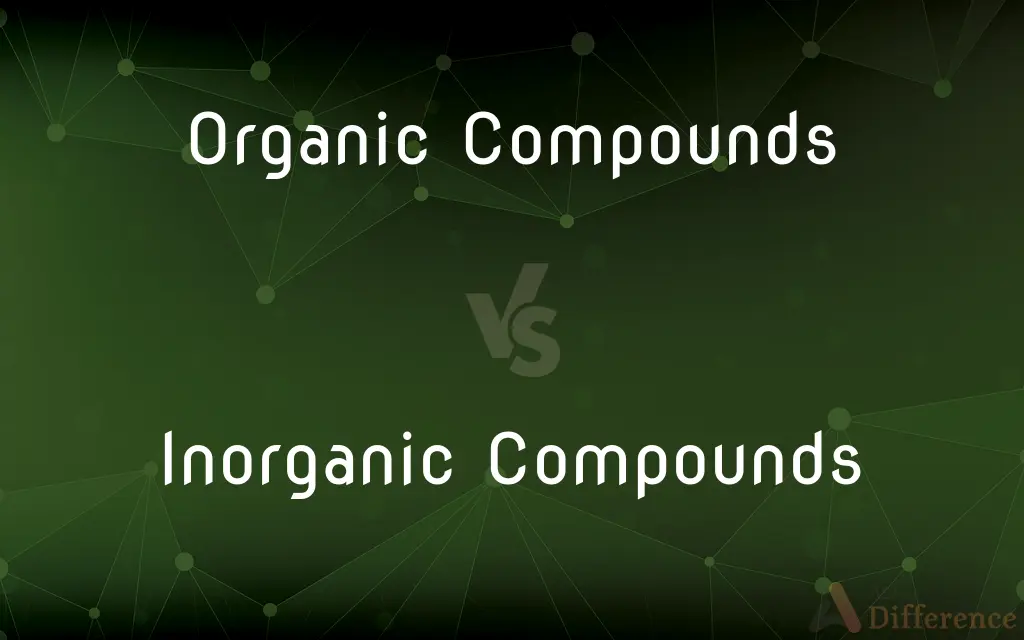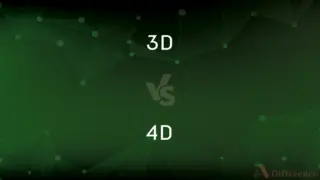Organic Compounds vs. Inorganic Compounds — What's the Difference?
By Tayyaba Rehman — Published on November 11, 2023
Organic Compounds primarily contain carbon and hydrogen bonds, originating from living things. Inorganic Compounds don't necessarily contain carbon and are typically derived from non-living sources.

Difference Between Organic Compounds and Inorganic Compounds
Table of Contents
ADVERTISEMENT
Key Differences
Organic Compounds and Inorganic Compounds are differentiated chiefly by their molecular structure and origin. Organic Compounds typically have carbon atoms bonded to hydrogen, forming the basis of all life. In contrast, Inorganic Compounds might not contain carbon and span a broader range of substances not associated with life.
Originating primarily from living entities or their remnants, Organic Compounds can be found in organisms, their by-products, or synthesized from biological sources. Inorganic Compounds, on the other hand, are often extracted from mineral and non-biological sources, emphasizing their non-living origins.
A significant property distinguishing Organic Compounds is the presence of complex carbon chains or rings. Inorganic Compounds usually lack these intricate structures, being simpler in composition and diverse in types.
It's important to note that while all Organic Compounds contain carbon, not every compound with carbon is organic. Inorganic Compounds like carbonates and carbides contain carbon but are not classified as organic.
In terms of application, Organic Compounds form the core of biochemistry, emphasizing life processes. In stark contrast, Inorganic Compounds dominate in fields like mineralogy and geochemistry, focusing on Earth's non-living aspects.
ADVERTISEMENT
Comparison Chart
Carbon Content
Contains carbon bonded primarily to hydrogen.
May or may not contain carbon.
Origin
Derived from living organisms.
Usually derived from non-living sources.
Complexity
Often have complex carbon chains/rings.
Generally simpler in structure.
Examples
Proteins, lipids, carbohydrates.
Salts, metals, water.
Applications
Biochemistry, organic chemistry.
Mineralogy, geochemistry, inorganic chemistry.
Compare with Definitions
Organic Compounds
Substances synthesized from biological processes.
Ethanol, produced during fermentation, is an Organic Compound.
Inorganic Compounds
Compounds not necessarily containing carbon.
Sodium chloride (table salt) is an Inorganic Compound.
Organic Compounds
Substances originating from living organisms.
Glucose is an Organic Compound essential for energy in cells.
Inorganic Compounds
Substances typically derived from non-living sources.
Most minerals like quartz are considered Inorganic Compounds.
Organic Compounds
Chemical compounds that form the basis of life.
DNA, carrying genetic information, is a critical Organic Compound.
Inorganic Compounds
Compounds that don't have long carbon chains/rings.
Water (H₂O) is a simple, yet essential Inorganic Compound.
Organic Compounds
Molecules primarily containing carbon and hydrogen.
Methane (CH₄) is among the simplest Organic Compounds.
Inorganic Compounds
Substances with elemental variety beyond carbon structures.
Ammonia (NH₃) is an Inorganic Compound with nitrogen as its base.
Organic Compounds
Compounds with complex carbon chains or rings.
Benzene, a ringed structure, is a common Organic Compound.
Inorganic Compounds
Chemical compounds spanning diverse structures and properties.
Iron oxide (rust) is an example of an Inorganic Compound.
Common Curiosities
Are all carbon-containing compounds organic?
No, compounds like carbonates and carbides contain carbon but are inorganic.
Are plastics considered Organic Compounds?
Yes, plastics have carbon-hydrogen bonds, classifying them as organic.
Can Organic Compounds be synthesized in labs?
Yes, many organic substances like drugs are synthesized for various applications.
Are all Organic Compounds safe for consumption?
No, many organic substances can be toxic or harmful.
Where are Organic Compounds primarily found?
They originate from living organisms or their by-products.
Why is the study of Organic Compounds essential?
They form the basis of life, impacting fields like medicine, biochemistry, and agriculture.
Can Inorganic Compounds be found in living organisms?
Yes, substances like water and minerals in the body are inorganic.
How vast is the range of Inorganic Compounds?
Immense, spanning salts, metals, minerals, and more.
Share Your Discovery

Previous Comparison
Asset Backed Securities vs. Mortgage Backed Securities
Next Comparison
3D vs. 4DAuthor Spotlight
Written by
Tayyaba RehmanTayyaba Rehman is a distinguished writer, currently serving as a primary contributor to askdifference.com. As a researcher in semantics and etymology, Tayyaba's passion for the complexity of languages and their distinctions has found a perfect home on the platform. Tayyaba delves into the intricacies of language, distinguishing between commonly confused words and phrases, thereby providing clarity for readers worldwide.












































